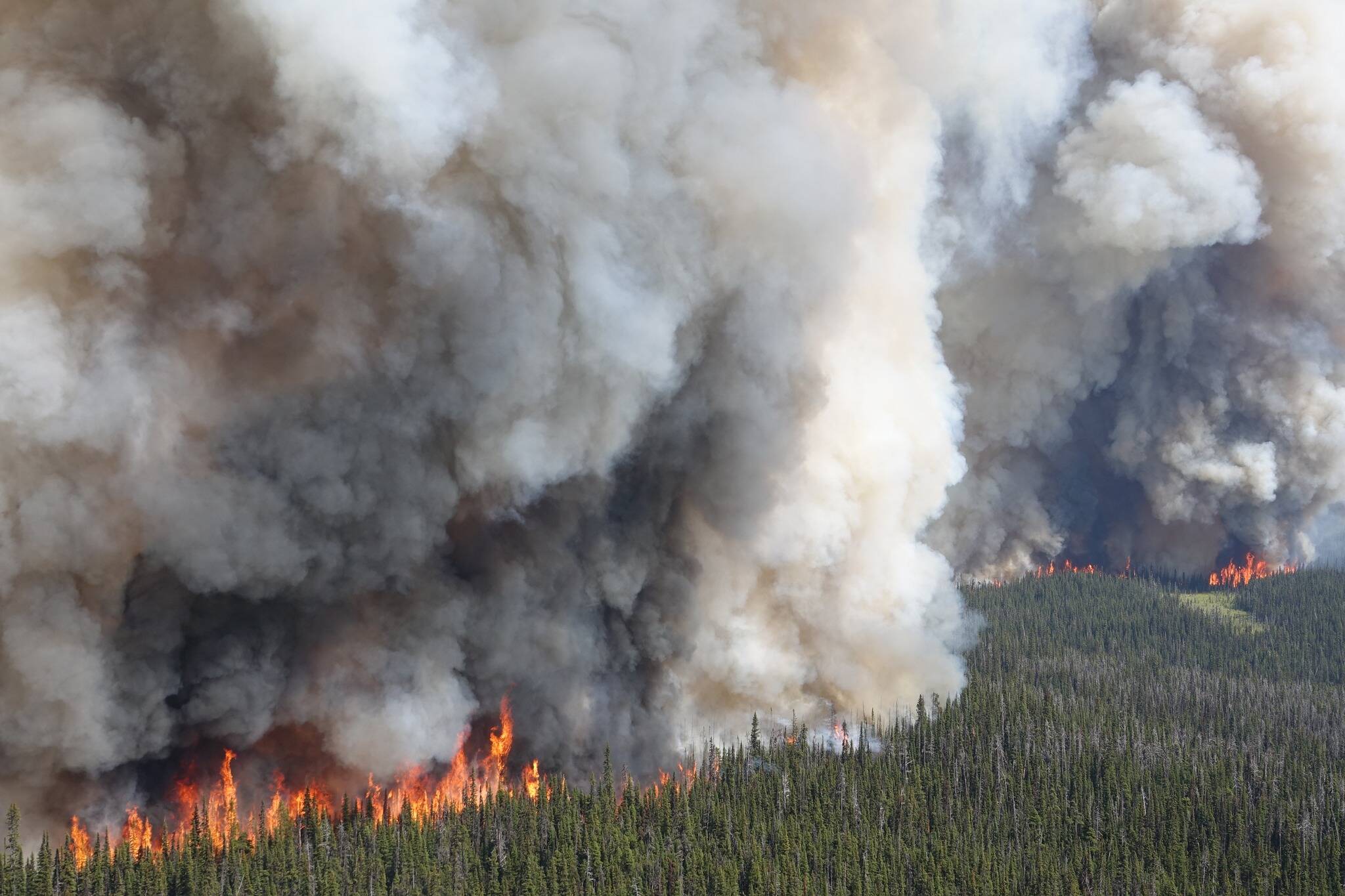As B.C. prepares for another potentially difficult wildfire season, the record-setting wildfire season of 2023 contributed to about 21 per cent of Canada’s carbon emissions from wildfires, according to the European Union’s Copernicus Atmosphere Monitoring System.
CAMS’s Global Fire Assimilation System uses fire radiative power observations from satellite-based sensors to produce daily estimates of wildfire and biomass burning emissions.
‘’CAMS estimated 102 megatonnes of carbon from wildfires in British Columbia for 2023,” Mark Parrington, CAMS senior scientist, said in a statement to Black Press Media. B.C’s contribution of 21 per cent to the Canadian total was similar to the emissions from the Alberta, which also experienced a difficult wildfire season, and only the Northwest Territories topped B.C., Parrington added.
Putting the figure of 102 megatonnes into perspective, B.C.’s total greenhouse gas emissions in 2021 reached 62 megatonnes of carbon dioxide equivalent, according to data from the provincial government’s environmental reporting website.
RELATED: B.C. wildfires contribute to record-smashing greenhouse gas emissions
Black Press Media asked CAMS for these figures after Copernicus had confirmed 2023 as the warmest calendar year in global temperature data records going back to 1850.
“In terms of the climate influence, many of the fires in British Columbia through the summer corresponded with drier than average conditions and above temperatures during the summer months,” Parrington said.
It’s not clear how B.C.’s wildfires, which burned 2.84 million hectares of forest and land, while temporarily chasing tens of thousands out of their homes, influenced the global climate.
“Climate impacts are more difficult to determine, but episodes of smoke to the Canadian Arctic may have led to some soot deposition on sea ice which could change the albedo and accelerate the melting (there), although we don’t currently have any direct evidence of this for 2023,” Parrington said.
The phrase albedo refers to the ability of surfaces to reflect sunlight. The lower the albedo, the more energy surfaces can absorb, leading to higher temperatures.
RELATED: B.C.’s snow-pack 44% below normal on heels of worst drought in recent memory
Notwithstanding current icy weather conditions across British Columbia, available evidence suggests another difficult wildfire season ahead.
The first Snow Survey and Water Supply Bulletin for 2024 shows the provincial snow-pack level 44 per cent below normal. This low snow pack could “significantly affect ongoing drought concerns” in summer 2024 and contribute to a difficult wildfire season.
Notably, more than 100 wildfires are still listed as burning in British Columbia thanks to a combination of a busy wildfire season, extreme drought and generally warmer and drier conditions through December.
Forrest Tower of the BC Wildfire Service said that while it’s not uncommon for some fires to burn through the winter, that number usually hovers around a couple dozen, not the 106 that were listed as active on New Year’s Day.
RELATED: B.C. wildfires still burning in more than 100 locations
Speaking Wednesday (Jan. 17) in Prince George at the Natural Resources Forum, Forest Minister Bruce Ralston said the prospect of another tough fire season is before British Columbians.
“We are prepared for that,” he said. “The BC Wildfire Service is funded and whatever it takes to protect communities, businesses and families, we will do. The challenge is the long run. How do we better protect communities through programs, which are preventative?”
Ralston specifically pointed to the FireSmart BC program administered together with the Union of British Columbia Municipalities.
“We are certainly actively funding projects and working with communities to make them safe in the future,” he said. “A lot of the fires we saw last year (occurred) at what they call the interface where the forest meets typically a suburban community and that is where many of the homes in the Okanagan were burnt last year.”
He added government is actively working on preventing these types of interface fires.
“That is the big challenge, but I’m convinced that we are ready and prepared for the season to come.”
@wolfgangdepner
wolfgang.depner@blackpress.ca
Like us on Facebook and follow us on Twitter.

